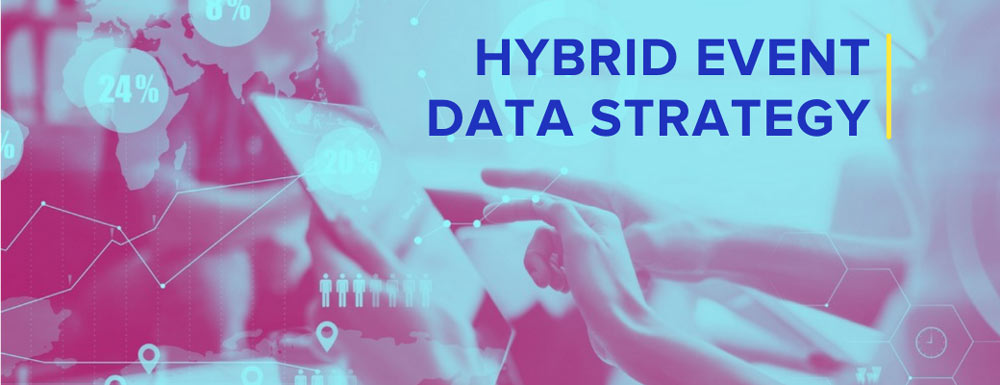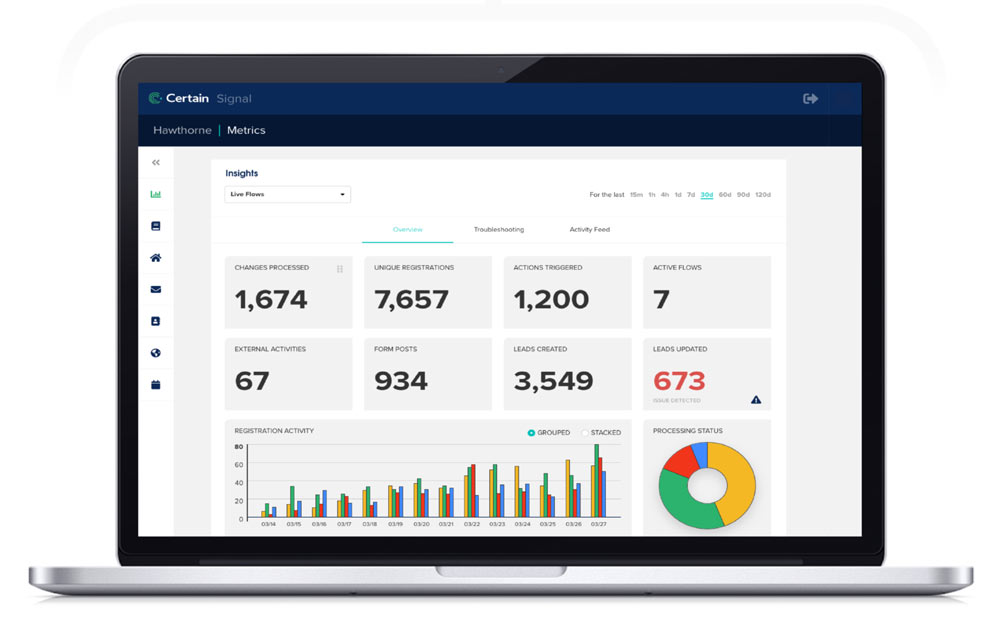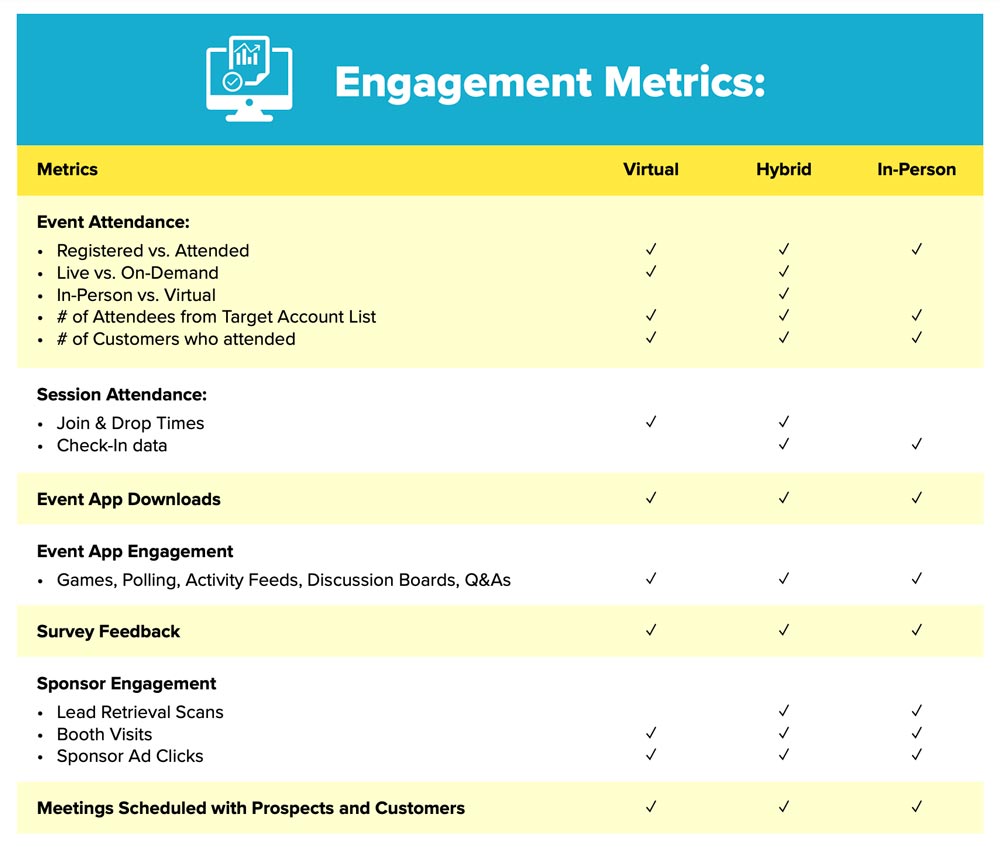As event marketers turn to hybrid events, a major challenge that they will inevitably face is the complexity of managing hybrid event data – a task that has grown exponentially with the blending of virtual and in-person audiences. For every event campaign (and this includes virtual, in-person and hybrid events) marketers should have a trusted plan for collecting and analyzing data.
And with the added data points brought by hybrid audiences, an event data strategy has never been more essential for businesses who are looking to effectively understand and report on their event success.
Below are the key factors for establishing an intelligent event data strategy that helps you connect your events to results.
Collecting Data
One of the primary reasons you collect data from your event participants is to measure how successful the event was in meeting your goals. The more data you can gather and analyze, the better your ability to repeat components of your program that worked well and optimize other parts that missed the mark.
No matter what your event type, gathering event data also allows you to better understand your customer or prospect and how they interact with your brand.
When constructing your event data strategy, start by deciding what data you will collect, at what points in the attendee journey you will collect it, and what you will use the information for. For example:
- Pre-Event: Event registration, mailing list clicks, opens and opt-ins, pre-scheduled meetings, and promotional engagements.
- During the Event: Attendee check-ins, no-shows, activity participation, virtual session join and drop times, social media shares, poll responses, private messages, Q&A discussions, meetings completed.
- Post-Event: Survey and poll responses, requests for further information, engagement with post-event marketing and 365 content.
Integrating Data
To make the most of your data and customer insights, your attendee engagement data must be integrated and shared across all of your technologies—CRM, marketing automation, communication, webcasting and event platforms. With a single view of your attendees’ data, you can create an integrated, seamless, and more impactful stream of communication to your customers and buyers across channels and touchpoints.
Data Analysis & Event Intelligence
Once you’ve gathered your data, you will need to analyze it to draw out actionable insights. You will basically be seeking answers to “who” and “how much.” For example:
Attendance Data:
- How many people from your target list registered and actually attended your event?
- What percentage of registrants showed up for the in-person portion of your programming versus the virtual?
- How many people attended breakout sessions and keynote presentations?
Engagement Data:
- How interactive were event attendees?
- How many replied to polls and surveys?
- Touched every milestone of the attendee journey? If not, at what point did they drop out?
- Clicked or checked into sponsor booths?
- Who engaged in discussions, Q&A sessions, or private messages?
- Who requested product samples, made a purchase or indicated an intention to buy?
- What collateral was downloaded?
- How many networking attendees engaged in meetings and were able to make at least one connection?
Here’s an list of some additional engagement metrics to track for virtual, in-person and hybrid events:
Event Business Intelligence
With the wealth of data collected from virtual, in-person and hybrid events, businesses are investing more heavily in business intelligence technologies to help with rendering their event data into actionable insights. This includes analyzing past events, planning future events, and telling the story of an event or series of events. For example:
- Single Events: Did we meet our goals? Who registered? Who came? Did they engage? How many 1:1 meetings were completed?
- Event Programs: What topics were the most engaging? What accounts engaged across the series? What content resonated with specific titles or personas? How can this inform the invitation strategy for the next event?
- Account-based: What accounts engaged with us across events? What questions are our strategic accounts asking?
A modern data strategy should incorporate business intelligence as a key factor for how to analyze data, measure key performance indicators (KPI) and seek out competitive advantages.
Taking Action on Data
By establishing a strong data strategy in advance of your event, you are setting up your sales and marketing teams to take immediate and intelligent action on attendee data throughout the event cycle.
Once you’ve collected and analyzed event data, you are in an informed position to make better decisions, capitalize on promising trends, and correct any initiatives that did not produce intended results. Post-event, this allows you to effectively measure ROI and generate insight reports for C-Suite leadership, as well as prepare data for handover to the sales team to assist them with nurturing and closing leads.
💡
To help the sales team prioritize their time, conduct lead scoring of your registrants based on values you’ve deemed important to your sales and marketing strategy. These can be items such as how much time a prospect spent in a session or booth, what company they work for, whether they attended in-person or virtually, or whether this was their first or fifth time attending one of your company’s events.
For individual leads, develop a personalized nurture track based on individuals’ interests and engagement metrics. On a macro scale, create a high-level view of account engagement to help the sales team develop an ABM strategy to pursue warm leads.
Events continue to play a crucial role in marketing strategies for their unique ability to connect people, build relationships, and share a brand’s message in a meaningful way – one that ultimately leads to real, measurable business results. As hybrid events are redefined in a post-pandemic world, having a strong event intelligence and data strategy will be the difference between proving ROI and getting lost in the wealth of attendee data.
For more info on hybrid event strategy, check out Certain’s Hybrid Event Strategy Playbook, or contact us for a free consult with one of our event experts!


